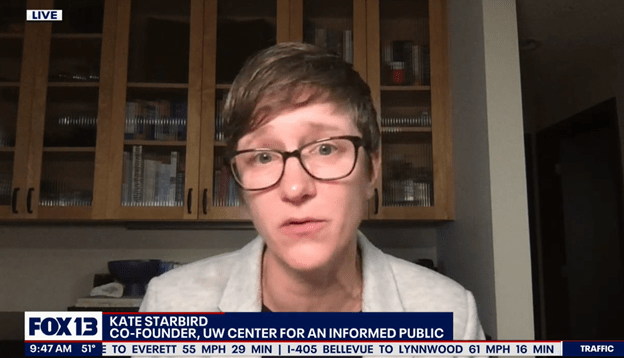How can I talk to family members and friends who embrace conspiracy theories? How do I pull them out of conspiratorial rabbit holes? These are tough, real-life questions so many people have been dealing with in their personal relationships with family members, friends, colleagues and others in their community. At the Center for an Informed Public, our researchers and staff often encounter these questions from members of the public.
In a recent Fox13 Seattle interview about an unfounded conspiracy theory that recently spread throughout Washington state, Kate Starbird, CIP faculty director and UW Human Centered Design & Engineering associate professor, fielded questions from Fox13 hosts Chynna Greene and Liz Dueweke about how people can talk with their friends or loved ones who have fallen down into conspiratorial rabbit holes or share and spread misinformation.
Unfortunately, there are no quick, easy answers
“Oftentimes, the pathways down the rabbit hole — which are Googling things they see on social media — that’s easy,” Starbird said. “Coming back from the rabbit hole? That’s hard. That’s not going to happen alone, in your room, on a computer.”
Starbird continued: “That’s going to come in conversations with other people who care about you and who you care about… that can help someone start to question some of this ideology that develops where they just don’t trust anything or anyone. I can see why those rabbit holes are really compelling right now because we’ve been disrupted the past two years. And we’ve had a polarized political space … on social media … for over a decade. I can see why people are vulnerable to this. The solutions are really going to be about coming together to build bridges with family members and loved ones and begin to talk through things and begin to recognize that not everything is a conspiracy.”
Instead of raising the drawbridge, throwing a ‘life buoy’
“For me, it’s always about leaving the bridges open for conversation,” Starbird said, stressing the importance of being empathetic while recognizing that’s not possible for everyone. “I hear so many stories in this research space about lost loved ones — in the sense that they can’t talk with them anymore because things are so contentious and they’re politically polarized and they just don’t share the same reality. And not everyone can, but for those of us who can, I feel that we can keep those bridges open or keep throwing out the life buoys and say, ‘I’m here. Let’s talk about it if we can.’ I’m not going to jump in the water with you, but I’ll throw a life buoy out and we can have conversations and hopefully repair some of what’s happening.”
What’s at stake
“I feel that in many ways, our families, our communities and our country are breaking apart and the crux of this is that we’re losing a shared reality” due to misinformation and conspiracy theories, Starbird said, concluding the interview.
RELATED:



